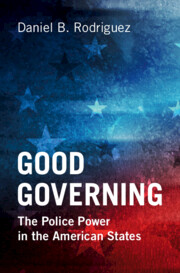Acknowledgments
This book reflects a deep dive into one key constitutional principle and power, but it reflects a wider amount of thinking about state constitutionalism and its form and function. Some of this thinking has resulted in published research, some has been sketched in various public lectures at law schools, and the rest has emerged rather organically from discussion in courses with terrific law students at various law schools where I have taught. And yet most of it is new with the work on this book. A number of prominent academics and judges, most recently the Hon. Jeff Sutton of the US Court of Appeals, have urged the academy to look beyond the US Constitution and federal constitutional law, to the myriad issues that arise in the context of state constitutions and state constitutional law. Hopefully this book responds to this call. State constitutions are at center stage of the most difficult debates and controversies in modern American politics, and I am hopeful that this book will be joined by a growing number of works to go onto the proverbial state constitutional law bookshelf.
In developing the book’s central ideas, I have drawn upon earlier presentations and lectures. In 2020, I gave the Victor Johnson Lecture at Vanderbilt Law School, and that helped me in organizing many of the themes in this book. Before that, I had given a number of endowed lectures that helped to develop and sharpen various ideas here. These include the Jefferson Memorial Lectures at the University of California, Berkeley, the William Brennan Lecture on State Constitutional Law at Oklahoma City University Law School, the Rutgers State Constitutional Law Lecture, and the Nathaniel Nathanson Memorial Lecture at the University of San Diego. Thanks to the colleagues who invited me to give these lectures and to the participants who contributed their thoughts. I am thankful for good comments at faculty workshops and symposia at the law schools at New York University, University of San Diego, Texas A&M University, the University of Kentucky, and the University of Bologna. Late in the life of this manuscript, I had the benefit of a roundtable on this book, organized by Northwestern’s Center on Law and Business, under the direction of my colleague Alex Lee, and with the valuable help of Derek Gundersen. A number of leading scholars participated in this meeting and made this book appreciably better. They include Bridget Fahey, Lee Fennell, Tom Gaylord, Joanna Grissinger, Jamila Jefferson-Jones, Anthony Michael Kreis, Alex Lee, Gregory Mark, Jonathan Marshfield, Ajay Mehrotra, Jim Rossi, Nadav Shoked, and Justin Weinstein-Tull.
Special thanks to early mentors at University of California, Berkeley, where I began my academic career and where my interest in issues of federalism, structural constitutional law, and state constitutional law was stoked. They include Jesse Choper, Robert Cooter, Robert Post, Ed Rubin, Harry Scheiber, Martin Shapiro, and Jan Vetter. Two other great scholars deserve mention. Mat McCubbins (who passed away in the summer of 2021) and Barry Weingast, my teachers, good friends, and frequent co-authors, have both helped me to better understand puzzles in American constitutional politics and regulation and have modeled for me and others what first-rate interdisciplinary scholarship is.
Thanks to a great group of Northwestern research assistants, including Abigail Kuchnir, Paul Piazza, Christian Flowers, Adam Hitti, Quinn Bessette, and Immer Chriswell, for help at various stages. Tom Gaylord of our wonderful law library has been, and continues to be, an excellent resource in many ways. I appreciate the support of the two deans who have been at Northwestern during the duration of this book’s work, Jim Speta and Hari Osofsky. Thanks to the great editorial and production team at Cambridge University Press, including Matt Galloway, a champion of this project from the early stages, and also Jadyn Fauconier-Herry.
Last but not least, I am incredibly grateful for the support of my wife (and colleague), Leslie Oster, in various ways, including as an occasional editor, and also to my growing Texas family. This book is dedicated to my parents, living and deceased, whose support and impact has been immeasurable.

